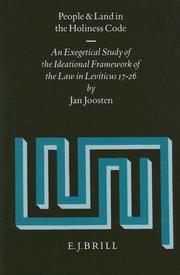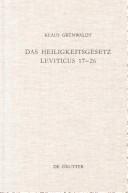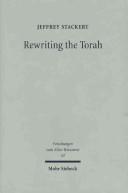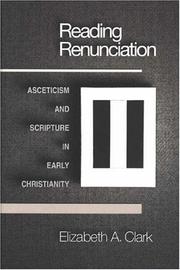| Listing 1 - 7 of 7 |
Sort by
|
Book
ISBN: 3161555473 9783161555473 3161551907 9783161551901 Year: 2017 Publisher: Tübingen Mohr Siebeck
Abstract | Keywords | Export | Availability | Bookmark
 Loading...
Loading...Choose an application
- Reference Manager
- EndNote
- RefWorks (Direct export to RefWorks)
Publisher's description: In this study, Paavo N. Tucker investigates different models of the formation of the Priestly literature in the Pentateuch by analyzing the relationship between the Priestly narratives in the Book of Exodus and the laws of the Holiness Code in Lev 17-26.
Bible. --- Bible. --- Criticism, interpretation, etc. --- Holiness Code --- Penteteuch --- Book of Exodus --- Priestly Literature --- Altes Testament --- Religionswissenschaft

ISSN: 00835889 ISBN: 9004105573 9004275916 9789004105577 Year: 1996 Volume: 67 Publisher: Leiden ; New York ; Köln E.J. Brill
Abstract | Keywords | Export | Availability | Bookmark
 Loading...
Loading...Choose an application
- Reference Manager
- EndNote
- RefWorks (Direct export to RefWorks)
This work proposes a reconstruction of the thought world underlying the Holiness Code (Leviticus 17-26). It focuses on the notions of people and land, which are central to the way the law is presented in this corpus. Important themes treated include the sons of Israel, the resident alien, the call to holiness, the camp in the desert and the land as the property of the Lord. The conceptual universe of the Holiness Code is entirely dominated by the notion of the presence of the Lord in his sanctuary, in the midst of his people. It is this presence which requires the Israelites to observe holiness and confers upon the land its particular status. The priestly conception of the relationship between God, people and land finds interesting parallels in the ideology of holy places evidenced in writings from the Ancient Near East.
Bible --- Criticism, interpretation, etc --- 222.3 --- Exodus. Leviticus. Numeri --- Theses --- Bible. --- Holiness code --- Holiness legislation --- Criticism, interpretation, etc.
Book
ISBN: 3161549384 Year: 2016 Publisher: Tübingen, Germany : Mohr Siebeck,
Abstract | Keywords | Export | Availability | Bookmark
 Loading...
Loading...Choose an application
- Reference Manager
- EndNote
- RefWorks (Direct export to RefWorks)
Wie reagieren die zeitgenössischen biblische Texten auf die grundlegenden wirtschaftlichen Veränderungen der Perserzeit (6.-4. Jh. v.Chr.)? Peter Altmann untersucht die elementaren Wirtschaftskonzeptionen des alten Orients und früherer biblischer Texte, um zu zeigen, wie biblische Texte aus der Perserzeit mit solchen wirtschaftlichen Phänomenen umgehen.
Economics in the Bible. --- Bible. --- Criticism, interpretation, etc. --- Iraq --- History --- Isaiah --- coinage --- Holiness Code --- Alte Geschichte --- Altorientalistik --- Altes Testament

ISBN: 3110162792 3110800772 9783110162790 Year: 2014 Volume: 271 Publisher: Berlin ; Boston : De Gruyter,
Abstract | Keywords | Export | Availability | Bookmark
 Loading...
Loading...Choose an application
- Reference Manager
- EndNote
- RefWorks (Direct export to RefWorks)
Sanctification --- Holiness --- Judaism --- 222.3 --- Exodus. Leviticus. Numeri --- Bible. O.T. Leviticus XVII-XXVI --- Relation to Deuteronomy --- Law (Theology) --- Biblical teaching --- Bible. --- Holiness code --- Holiness legislation --- Criticism, interpretation, etc. --- Criticism, Redaction. --- Sanctification. --- Judaism. --- Perfection --- Religion --- Religious aspects --- Holiness - Judaism
Book
ISBN: 9783110275575 9783110275605 3110275570 3110275600 1283628422 9786613940872 Year: 2012 Volume: 430 Publisher: Berlin ; Boston De Gruyter
Abstract | Keywords | Export | Availability | Bookmark
 Loading...
Loading...Choose an application
- Reference Manager
- EndNote
- RefWorks (Direct export to RefWorks)
The sabbatical year law in Lv 25,1-7 stipulates the rest of the land and includes foreigners in the list of the beneficiaries, differently from the fallow year law in Ex 23,10-11 and from the debt-release law in Dt 15,1-11. These characteristic features originate from the universalism of creation theology of the Holiness Code: the sabbatical year law in Leviticus aims to practice the God's creation order in Gn 1-2,4a in human history. Moreover, this law functions as a criterion of the interpretation of the history of Israel; the exilic tragedy in Babylonia has been caused by the negligence of the rest of the Israel's land. The study on the sabbatical year law in Leviticus contributes not only to the research on the compositional history of the Hebrew Bible, but also offers the precious messages on the political, socio-economic, and ecological problems in our times.
Sabbatical year (Judaism) --- Agricultural laws and legislation (Jewish law) --- 222.3 --- Jewish law --- Shemiṭah --- Shemittah --- Exodus. Leviticus. Numeri --- Bible. --- Holiness Code. --- Israel and the Nations. --- Leviticus. --- Sabbatical Year.

ISBN: 9783161492983 3161492986 Year: 2007 Volume: 52 Publisher: Tübingen Mohr Siebeck
Abstract | Keywords | Export | Availability | Bookmark
 Loading...
Loading...Choose an application
- Reference Manager
- EndNote
- RefWorks (Direct export to RefWorks)
Jeffrey Stackert explores literary correspondences among the pentateuchal legal corpora and especially the relationships between similar laws in Deuteronomy and the Holiness Legislation (Lev 17–26, the so-called »Holiness Code,« as well as significant parts of the Priestly source elsewhere in the Pentateuch). Resemblances between these law collections range from broad structure to fine detail and include treatments of similar legal topics, correlations with regard to sequence of laws, and precise grammatical and lexical correspondences. Yet the nature and basis of these resemblances persist as debated points among biblical scholars. Through an analysis of the pentateuchal laws on asylum, seventh-year release, manumission, and tithes, the author argues that the Holiness Legislation depends upon both the Covenant Collection and Deuteronomy. He also elucidates the compositional logic of the Holiness legislators, showing that these authors do not simply replicate pre-existing legal content. Rather, they employ a method of literary revision in which they reconceptualize source material according to their own ideological biases. In the end, the Holiness Legislation proves to be a »super law« that collects and distills the Priestly and non-Priestly laws that precede it. By accommodating, reformulating, and incorporating various viewpoints from these sources, the Holiness authors create a work that is intended to supersede them all.
Bible --- Criticism, interpretation, etc --- 223.3 --- Psalmen --- Bible. --- Holiness code --- Holiness legislation --- Deuteronomium (Book of the Old Testament) --- Deuteronomy (Book of the Old Testament) --- Devarim (Book of the Old Testament) --- Kitāb-i Divārīm (Book of the Old Testament) --- Shinmeiki (Book of the Old Testament) --- Sifr al-Tathniyah (Book of the Old Testament) --- Sinmyŏnggi (Book of the Old Testament) --- Tas̲niyah (Book of the Old Testament) --- Tathniyah (Book of the Old Testament) --- Criticism, interpretation, etc.

ISBN: 0691005117 0691005125 1400823188 1282753770 9786612753770 1400811244 9781400823185 1400801230 9780691005126 Year: 2001 Publisher: Princeton Princeton University Press
Abstract | Keywords | Export | Availability | Bookmark
 Loading...
Loading...Choose an application
- Reference Manager
- EndNote
- RefWorks (Direct export to RefWorks)
A study of how asceticism was promoted through Biblical interpretation, Reading Renunciation uses contemporary literary theory to unravel the writing strategies of the early Christian authors. Not a general discussion of early Christian teachings on celibacy and marriage, the book is a close examination, in the author's words, of how "the Fathers' axiology of abstinence informed their interpretation of Scriptural texts and incited the production of ascetic meaning." Elizabeth Clark begins with a survey of scholarship concerning early Christian asceticism that is designed to orient the nonspecialist. Section Two is organized around potentially troubling issues posed by Old Testament texts that demanded skillful handling by ascetically inclined Christian exegetes. The third section, "Reading Paul," focuses on the hermeneutical problems raised by I Corinthians 7, and the Deutero-Pauline and Pastoral Epistles. Elizabeth Clark's remarkable work will be of interest to scholars of late antiquity, religion, literary theory, and history.
248 "00/04" --- Asceticism --- -Ascetical theology --- Contempt of the world --- Theology, Ascetical --- Christian life --- Ethics --- Spiritualiteit. Ascese. Mystiek. Vroomheid--?"00/04" --- History --- -Asceticism --- Bible --- Criticism, interpretation, etc. --- Biblia --- Asceticism - History - Early church, ca 30-600 --- Acts of Paul and Thecla. --- Acts of Thomas. --- Adultery. --- Allegory. --- Ambrosiaster. --- Anchorite. --- Apologetics. --- Apostasy. --- Arianism. --- Asceticism. --- Basil of Ancyra. --- Basil of Caesarea. --- Bible. --- Body of Christ. --- Book of Judges. --- Book of Wisdom. --- Celibacy. --- Chastity. --- Christian Order. --- Christianity. --- Church Fathers. --- Clement of Alexandria. --- Clerical celibacy. --- Concupiscence. --- Consummation. --- Contra Celsum. --- Conversion to Christianity. --- Criticism of marriage. --- De fide. --- Dialogue with Trypho. --- Dispensation (canon law). --- Docetism. --- Donatism. --- Elijah. --- Epistle to the Ephesians. --- Evagrius Ponticus. --- Exegesis. --- Ezekiel. --- Fear of God. --- First Epistle to the Corinthians. --- Fornication. --- Gluttony. --- God. --- Helvidius. --- Heresy. --- Heterodoxy. --- Holiness code. --- Idolatry. --- Incest. --- Incorruptibility. --- Indulgence. --- Infidel. --- Jews. --- John Cassian. --- John Chrysostom. --- Jovinian. --- Judaizers. --- Justification (theology). --- Justin Martyr. --- Lactantius. --- Manichaeism. --- Marcion of Sinope. --- Marcionism. --- Matthew 25. --- Melania the Elder. --- Midrash. --- Monasticism. --- Montanism. --- New Testament. --- Old Testament. --- Origen. --- Paganism. --- Parable of the Great Banquet. --- Parable of the Ten Virgins. --- Paulinus of Nola. --- Pelagianism. --- Progressive revelation (Bahá'í). --- Rebuke. --- Religion. --- Religious text. --- Renunciation. --- Rule of Faith. --- Sacramentum (oath). --- Self-denial. --- Sexual Desire (book). --- Sexual abstinence. --- Sirach. --- Sola fide. --- Spiritual marriage. --- Spirituality. --- Spouse. --- Superiority (short story). --- Susanna (Book of Daniel). --- Tertullian. --- The City of God (book). --- Theodore of Mopsuestia. --- Theology. --- Thomas the Apostle. --- Thou shalt not commit adultery. --- Virginity.
| Listing 1 - 7 of 7 |
Sort by
|

 Search
Search Feedback
Feedback About
About Help
Help News
News